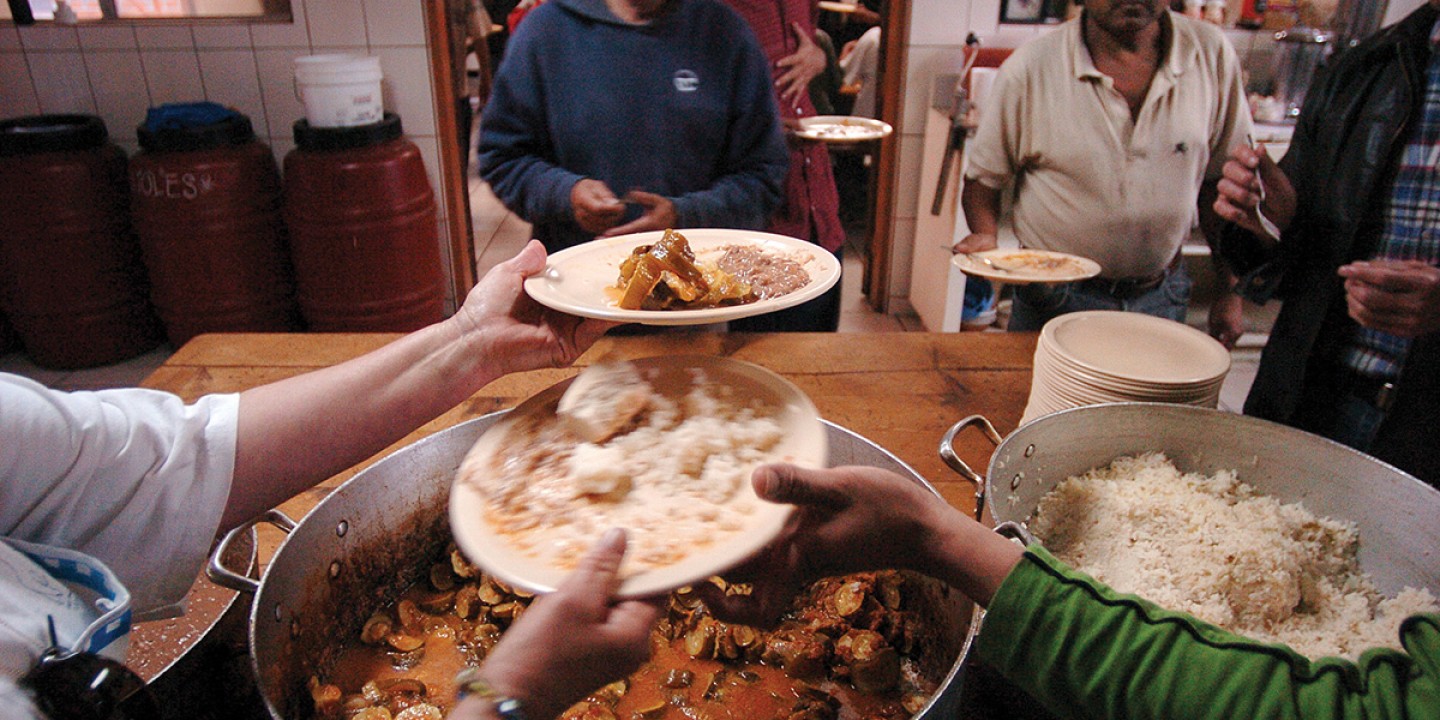At Tijuana shelter Casa del Migrante, every meal is holy
I take the morning shift to give the longer-term volunteers a few hours of rest.

I’m up at 5 a.m.—just me and the neighborhood roosters. My morning responsibilities at Casa del Migrante in Tijuana, Mexico, include the essential task of making sure the coffee is hot before the shelter’s residents rush to catch their buses to work.
I unlock the kitchen and flip on the lights. The cauldron rests on the gas burner. I have already mixed the instant granules in water and made the coffee the night before. Enough for the 50 adults in the compound, as well as the dozens of people from the streets who wait at the gate for breakfast—café y pan.
Read our latest issue or browse back issues.
While the cauldron warms, I set out bread and cereal and then pull yesterday’s leftovers from the walk-in refrigerator and start scooping food into containers for workers to take with them for lunch. Soon other volunteers make their way down to the kitchen in time for the steady stream of residents—first the people who depart early for jobs, then everyone else a couple hours later: parents with children and adults without work.
After the breakfast rush, whoever is around lingers in the open-air courtyard until staff arrive and gather the kids for educational activities while the adults begin their community chores.
Casa del Migrante is run by the Missionaries of St. Charles Borromeo, commonly known as the Scalabrinians—a Roman Catholic religious order founded in 1887 to minister to migrants. The shelter was established in 1987, the first of four Scalabrinian shelters in Mexico. Globally, the order administers more than 250 local ministries in 33 countries, all in service of people on the move: individuals and families who’ve fled from violence, from political oppression, from wrecked economies, from the devastations of our climate crisis.
Scalabrinian priest Patrick Murphy moved from Latinx ministry in Kansas City, Missouri, to Tijuana in 2013 when his order appointed him to serve, for the second time, as director of Casa del Migrante. Murphy has described the shelter in writing as “a field hospital on the front lines of the immigration battle . . . a place of healing where people find an oasis of hope in the desert of deportation.” Over 35 years, more than a quarter of a million people have sheltered there while heading north to cross the border—or while picking up the pieces of their lives after deportation from the United States.
“We strive to offer radical hospitality to those who enter our casa,” Murphy tells me, “in the spirit of Jesus in Matthew’s Gospel, who tells his disciples to welcome strangers as if they were him.”
Six long-term volunteers have kept the shelter operational during the COVID-19 pandemic. I’m here for a week to help with the work—to provide some relief in the kitchen, the endless labor of cooking for the residents. While I’m there I take the morning shift, to give the others a chance for a few more hours of rest.
After the morning bustle, Miguel, the community chef, walks into the kitchen, straps on his bib apron, and begins the prep work for dinner. I put away the last of the breakfast foods, clearing space for his work station, while he darts around the kitchen methodically enacting the ingenious dinner plan he’s devised for two turkeys the shelter was given the day before, turning donated items into delicacies. “I like to make meals they can’t afford,” he explains, “because everyone should get a chance to experience the delight of food.”
While attending to the turkey preparations, Miguel instructs me in the art of making arroz y frijoles for a hundred. He gently scatters chunks of red onion into a massive pot of shimmering oil. I stir with a wooden spoon the size of an oar as they blister, then blacken. “Para darle sabor,” Miguel explains as he fishes out the onions and sets them aside for the turkeys. For flavor.
He dumps a bucket of rice into the pot. The grains crackle in the oil. “The rice needs to brown but can’t stick to the bottom,” he says while showing me how to stir. I get the spoon stuck, then work it free with a bang against the metal rim as the rice clumps and clings. Miguel shows me the technique again, how to push and pull the rice. The work is like a dance around the pot.
I lose track of time as I focus on the rice and trip over my feet. After ten minutes, 20 minutes—at some point Miguel sneaks over and pours in a bucket of caldo, the leftover broth from a chicken he boiled yesterday. As the rice simmers he adds another bucket, this one filled with the tomatoes and onions and garlic he had me liquefy in the blender earlier. Then he sprinkles in a handful of salt in the form of a cross. I watch in silence and feel like I should also cross myself en el nombre del Padre y del Hijo y del Espíritu Santo.
There in Miguel’s kitchen, a story about Heraclitus flashes to mind. When pilgrims search for the great philosopher of ancient Greece, they find him in the kitchen near the stove. “Come in,” he invites them, “for there are gods here too.”
The morning shift, which began before daybreak, ends at 2 p.m. In the shower I wash away the layers of cooking grease and then rest for a while in the volunteer lounge on the fourth floor. Soon I hear the bustle of life from below and return to the courtyard. I join a long-term volunteer, Anny from Costa Rica, as she serves bowls of jicama con tajin, a predinner snack.
In the kitchen, new arrivals make Salvadoran guacamole which, to Anny’s surprise and mine, includes hard-boiled eggs. A woman from Sinaloa, Mexico, rolls out her masa for tortillas and passes them to her son, who fries them a la plancha. Later she squeezes a lime and sprinkles salt on the warm tortilla in my hand, and she tells me that they fled her home a couple weeks ago after the cartel tried to recruit her 16-year-old son. She is on her way to her sister in Fresno, if they’re able to get across. “Pastor, ¿podrías orar por mí?” Will you pray for me?
Life at Casa del Migrante revolves around the kitchen, from before dawn until after bedtime. Someone is always there, preparing for the next meal or cleaning up after the last. Around the stove food and stories pass from person to person.
After dinner, after everyone in the shelter has enough to eat, with the dishes cleaned and the floors mopped, Miguel passes me a beer and I ask what’s his favorite food to make. “Rice and beans, arroz y frijoles,” he answers without a second thought. This kitchen comes with a huge responsibility, he explains, because so many depend on our work for their food. “We cook to sustain the gift of life, as strength for the journey, como una bendición para los que tienen que cruzar.” As a blessing for those who have to cross.
Before the resurrected Jesus crosses from earth to heaven—before his disappearance, his joining the multitudes of the desaparecidos—he cooks a meal for his friends. One morning at dawn Jesus roasts fish and warms bread over a charcoal fire. “Come and have breakfast,” he tells the disciples after their long night of work at sea (John 21:12). He takes time to make food, to feed people, to provide for human life.
At the casa every meal is holy: café y pan, arroz y frijoles. The domestic arts of the kitchen are sacred rites of communion—tortillas hecho a mano (made by hand) with a spoonful of Salvadoran guacamole. Food and stories pass from person to person—conversations about who crossed yesterday, wonderings about who might cross tomorrow. Every meal is a last supper. I whisper prayers to myself for their safety, for no more broken bodies, for no more deaths in the borderland’s deserts.
A version of this article appears in the print edition under the title “In Miguel’s kitchen.”






